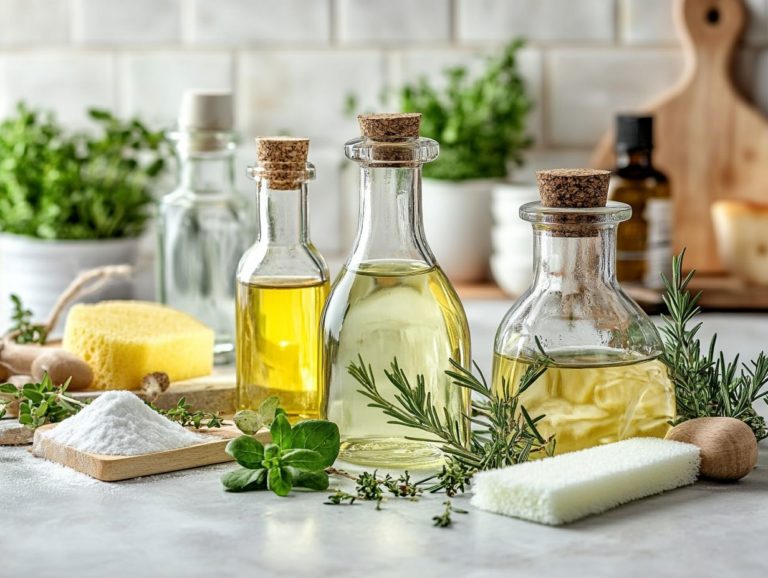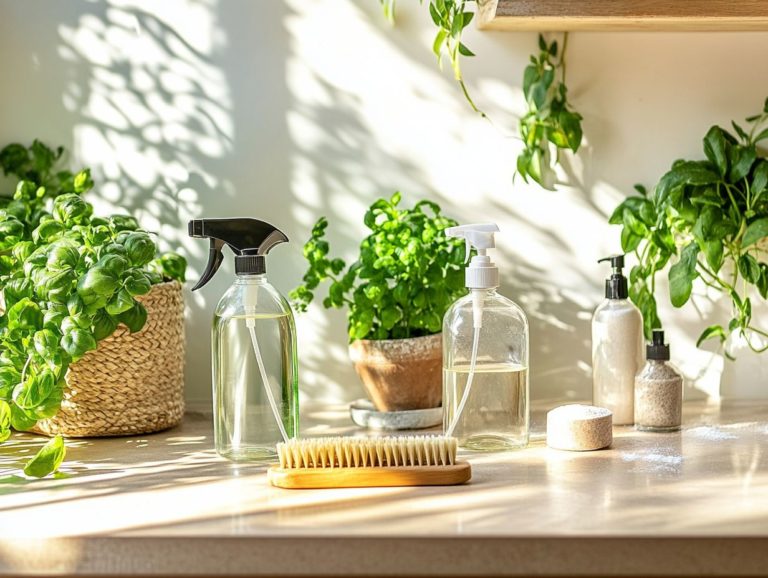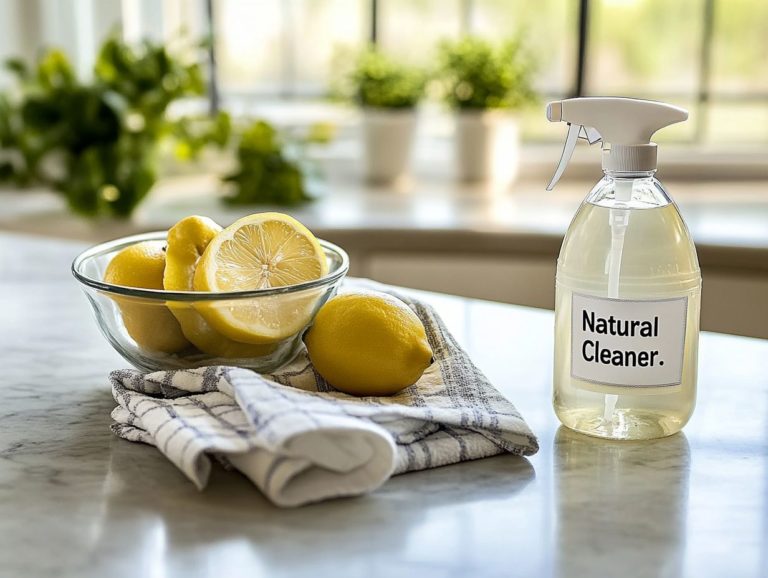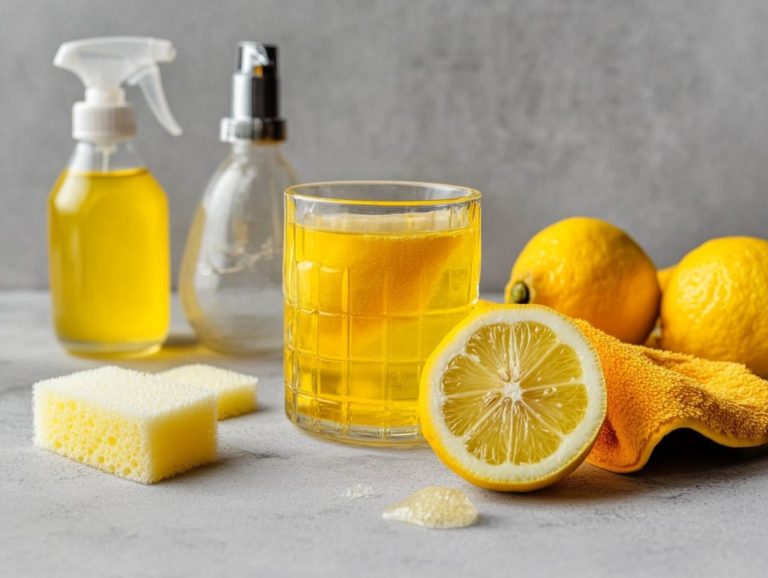Why Coconut Vinegar is a Great Cleaning Agent
Coconut vinegar is not merely a delightful addition to your culinary repertoire; it also serves as an eco-friendly cleaning dynamo. Crafted from the fermentation of coconut sap, this natural solution offers many benefits, including significant health benefits, positioning it as an exceptional alternative to harsh chemical cleaners.
In this article, you’ll delve into the fascinating fermentation process of how coconut vinegar is produced, uncovering its impressive antibacterial and antifungal properties. You’ll discover how to harness its gentle yet effective cleaning power throughout your home, and even explore its versatile uses in South Indian cuisine.
The discussion also covers its various uses beyond cleaning. This will help you appreciate how coconut vinegar can enhance your life.
Contents
- Key Takeaways:
- Discover the Wonders of Coconut Vinegar!
- How Is Coconut Vinegar Made?
- Unlock the Amazing Benefits of Coconut Vinegar for Your Home!
- How to Use Coconut Vinegar for Cleaning?
- Are There Any Risks or Side Effects of Using Coconut Vinegar for Cleaning?
- Other Uses of Coconut Vinegar
- Frequently Asked Questions
- What is coconut vinegar and why is it a great cleaning agent?
- How does coconut vinegar compare to other cleaning agents?
- What surfaces can coconut vinegar be used on?
- Can coconut vinegar be used for tough stains and grime?
- Is coconut vinegar safe for use on delicate surfaces?
- Are there any other benefits to using coconut vinegar as a cleaning agent?
Key Takeaways:
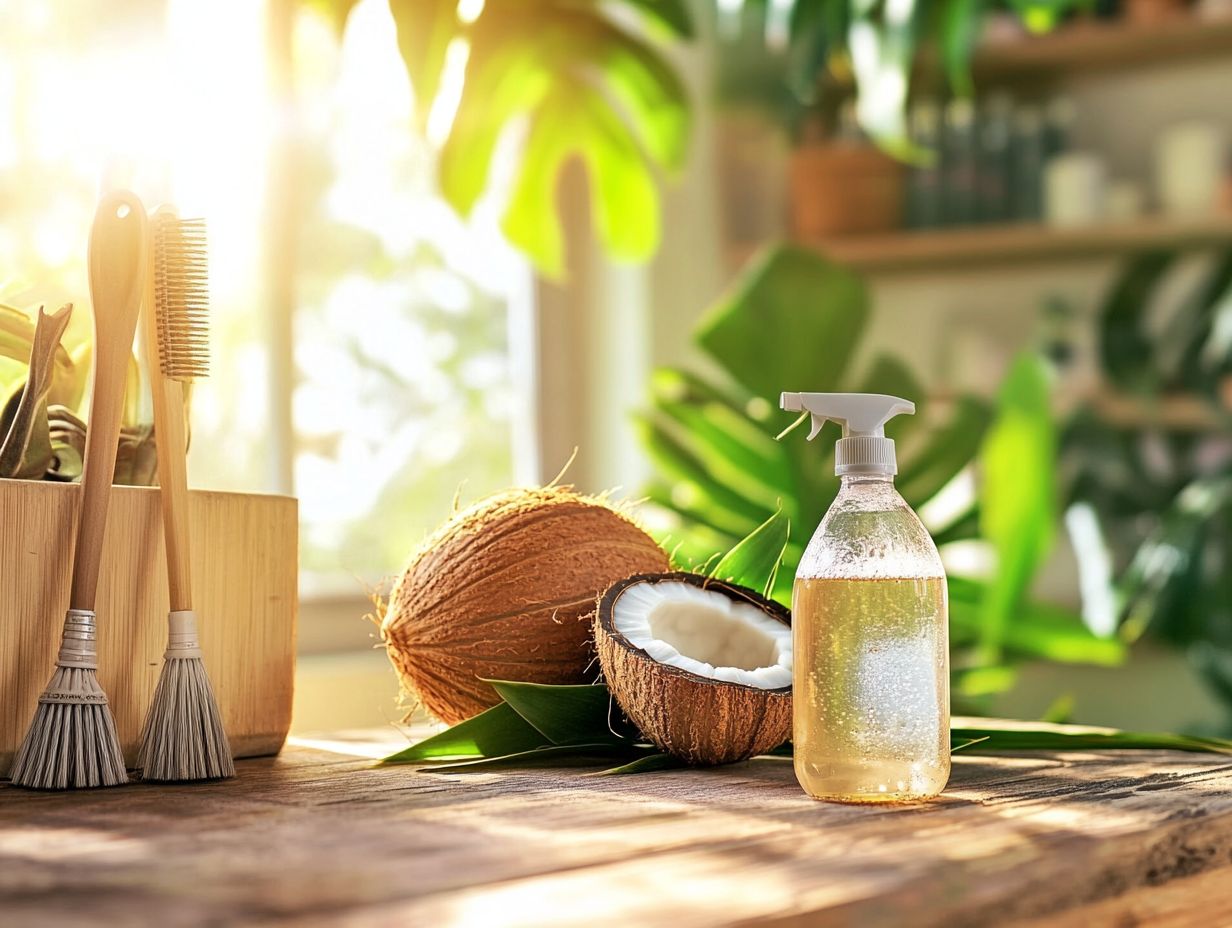
- Natural and non-toxic alternative to chemical cleaning products.
- Powerful antibacterial and antifungal properties make it effective at killing germs.
- Gentle on surfaces and leaves a pleasant scent, making it safe and enjoyable to use.
Discover the Wonders of Coconut Vinegar!
Coconut vinegar, a cherished staple from the enchanting state of Kerala, is an exquisite and versatile condiment crafted from the sap of coconut trees, the water of coconuts, or even coconut oil. This natural vinegar has not only earned its place in South Indian cuisine but has also captivated the Western health food scene, thanks to its subtly milder taste and a host of health benefits, including its rich potassium content and probiotic properties.
The esteemed Chef Joe Thottungal, hailing from the renowned Coconut Lagoon, has been instrumental in elevating coconut vinegar as a raw health ingredient, introducing it to culinary aficionados worldwide. Similarly, Chef Leah Cohen has also been a proponent of its use in modern cooking.
How Is Coconut Vinegar Made?
The production of coconut vinegar entails a meticulous fermentation process that transforms the sap from coconut trees, coconut water, or even coconut oil into a tangy, flavorful condiment. Often referred to as ‘toddy’ in the Philippines and parts of South India, it serves as a traditional staple, enriching culinary experiences with its distinctive taste.
Unlock the Amazing Benefits of Coconut Vinegar for Your Home!
The benefits of using coconut vinegar as a cleaning agent go far beyond the kitchen. This versatile ingredient boasts impressive antibacterial and antifungal properties, making it an ideal choice for anyone looking for natural alternatives to conventional cleaning products. Additionally, its rich acetic acid content a type of acid found in vinegar that helps with cleaning can help in regulating cholesterol levels and improving the immune system.
Embracing coconut vinegar not only elevates your cleaning routine but also aligns with a healthier, eco-friendly lifestyle, including benefits such as reducing blood sugar and supporting heart health. Don’t wait to make your home safer!
1. Natural and Non-toxic
Coconut vinegar stands out as a natural and non-toxic alternative to conventional cleaning agents, making it an exceptional choice for those who wish to minimize chemical exposure in their homes.
This versatile elixir not only cleans but also disinfects, offering you a safe and effective means to maintain a hygienic living environment. Incorporating coconut vinegar into your cleaning routines comes with significant benefits; it refrains from releasing harmful fumes or residues, ensuring the safety of both children and pets in your household.
Opting for such eco-friendly solutions positively impacts the environment, promoting a cleaner and healthier planet for all. By embracing natural cleaning agents like coconut vinegar, you can cultivate a safer atmosphere while still achieving impressive results in your cleaning endeavors.
In conclusion, coconut vinegar is not only a valuable cooking ingredient but also a powerful ally in maintaining a clean and healthy home. Start enjoying its benefits today!
2. Antibacterial and Antifungal Properties
The antibacterial and antifungal properties of coconut vinegar position it as a strong helper against various pathogens, including E. coli and G. vaginalis. This contributes to a cleaner and healthier home environment.
Research has shown that the acetic acid in coconut vinegar is the main component of vinegar that gives it its sour taste and strong cleaning properties. It not only acts as a natural disinfectant but also forms a barrier against harmful microorganisms. A noteworthy study published in the Journal of Food Science emphasized vinegar’s effectiveness against common foodborne bacteria, showing its potential role in enhancing food safety and hygiene.
When you incorporate coconut vinegar into your household cleaning routines, you will dramatically reduce germs and keep your home sparkling clean! By making coconut vinegar a staple in your daily practices, you can leverage its natural properties, ensuring your living space remains hygienic without relying heavily on synthetic products.
3. Gentle on Surfaces
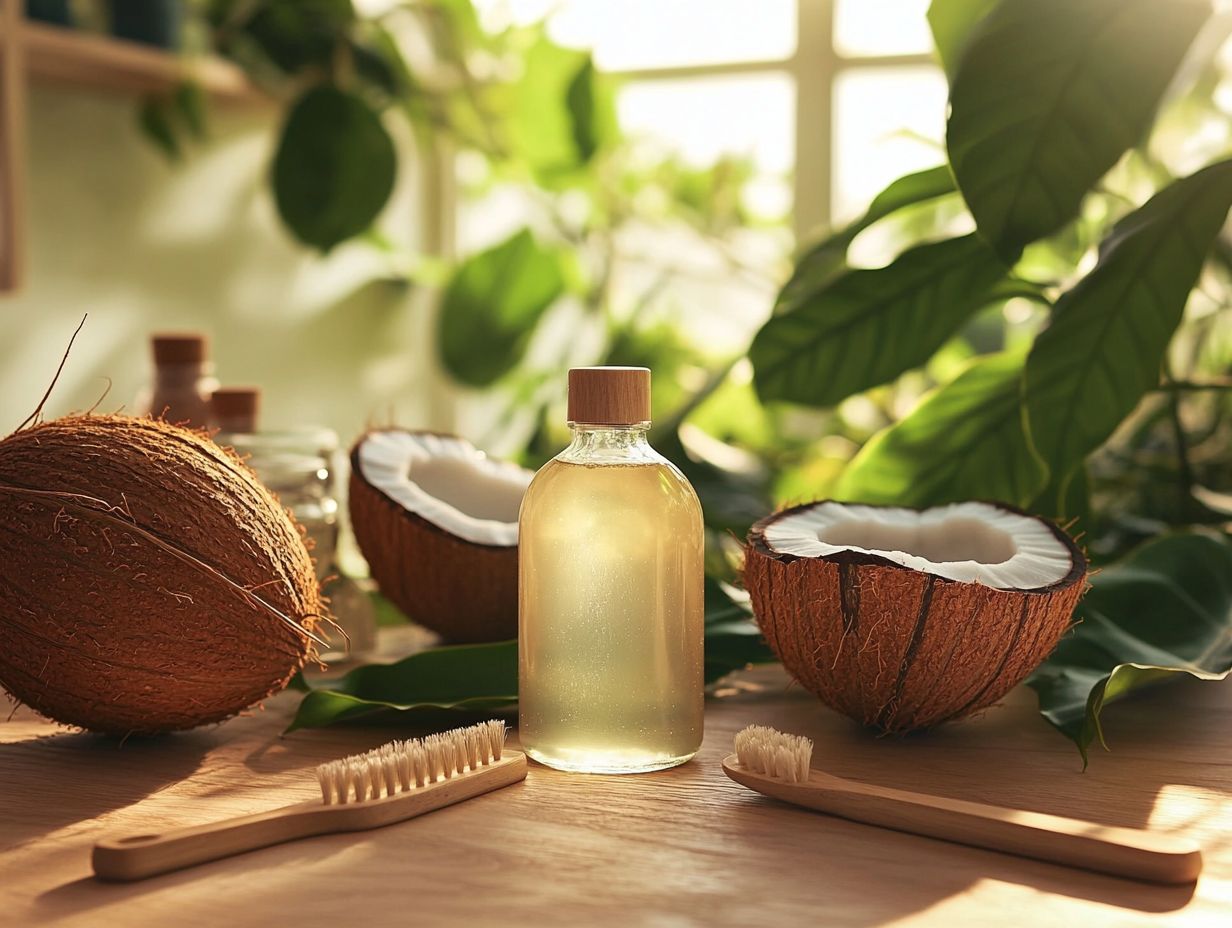
One of the remarkable benefits of using coconut vinegar as a cleaning agent is its gentle touch on surfaces. It allows for effective cleaning without the abrasive nature of traditional chemical cleaners. This makes it an excellent choice for a wide range of surfaces, from delicate countertops to sparkling glass and robust floors.
When you apply coconut vinegar, mix one part coconut vinegar with one part water for the best results, particularly for sensitive materials. For instance, when you re cleaning glass, this 50/50 mixture can leave a streak-free shine while ensuring the glass remains scratch-free.
On countertops, especially those made from wood or stone, this diluted solution can lift away grime without compromising the finish. For floors, using a mop tailored to the specific surface type whether tile or laminate will ensure that this natural cleaner performs effectively while preserving the integrity of each surface.
4. Pleasant Scent
Unlike many conventional cleaners that unleash harsh chemical odors, coconut vinegar provides a delightful scent, transforming cleaning into a more pleasant experience. This natural vinegar can even be used in culinary dishes like mango curry to enhance flavors.
This refreshing fragrance enhances the cleaning process and infuses your home with a refreshing atmosphere. As the sweet, inviting aroma of coconut vinegar fills the air, it elevates a mundane chore into a revitalizing ritual, enriching the overall ambiance of your space.
The subtle sweetness of the scent can help reduce stress and uplift your mood, allowing you to savor your surroundings more fully. This delightful fragrance lingers, reminding you of a clean and inviting home, which can be particularly appealing to both guests and family alike.
How to Use Coconut Vinegar for Cleaning?
Using coconut vinegar for cleaning is both effective and remarkably straightforward. You can easily transform it into a variety of cleaning solutions, including an all-purpose cleaner, a glass cleaner, and even a laundry stain remover. You can also use coconut vinegar in cooking, making it a truly versatile ingredient.
1. All-Purpose Cleaner
An all-purpose cleaner made from coconut vinegar is a breeze to prepare and can handle a variety of cleaning tasks around your home.
Not only does it leverage the natural disinfecting properties of vinegar, but it also leaves behind a delightful, mild scent, free from the harsh chemicals often found in commercial cleaners. To whip up this environmentally friendly solution, you ll only need a few simple ingredients that are likely already tucked away in your kitchen pantry, such as coconut vinegar and apple cider vinegar.
The foundation consists of coconut vinegar, known for its antibacterial qualities, paired with water and optional essential oils for that extra touch of fragrance. This DIY cleaner is not only easy on your wallet, but it also serves as a sustainable alternative to traditional cleaners, fostering a healthier living environment for you and your loved ones.
2. Glass and Mirror Cleaner
Coconut vinegar can be your go-to ingredient for creating a powerful glass and mirror cleaner that leaves surfaces perfectly streak-free and gleaming. This natural cleaning solution not only taps into the antibacterial properties of coconut vinegar. It also contains Vitamin C, which boosts its cleaning power and positions you as an environmentally conscious cleaner.
To whip up your glass cleaner, simply combine equal parts coconut vinegar and water in a spray bottle. For an extra boost, consider adding a few drops of essential oil, like lemon or tea tree oil this makes it smell better and enhances the cleaning prowess of your solution. This method is inspired by traditional practices from Coconad households.
When it comes time to apply this mixture, reach for a microfiber cloth. This choice minimizes lint and maximizes absorption, ensuring that your glass surfaces shine brilliantly without any streaks left behind.
3. Floor Cleaner
Using coconut vinegar as a floor cleaner transforms your surfaces into a clean and rejuvenated haven, all without the harsh chemicals typically found in conventional cleaners.
This natural solution isn t just eco-friendly; it s also impressively versatile, making it perfect for a variety of flooring types, including wood, tile, and vinyl.
To effectively clean your wood floors, mix one part coconut vinegar with four parts water. Gently mop the surface with this solution, taking care not to saturate it too much to protect the integrity of the wood.
For tile floors, a blend of one part vinegar to two parts water will help you tackle grime while remaining gentle on your grout.
In terms of vinyl surfaces, a similar dilution works wonders, allowing for a quick wipe-up that leaves your floors sparkling without any unsightly residue.
Always test on a small area first for the best results!
4. Laundry Stain Remover
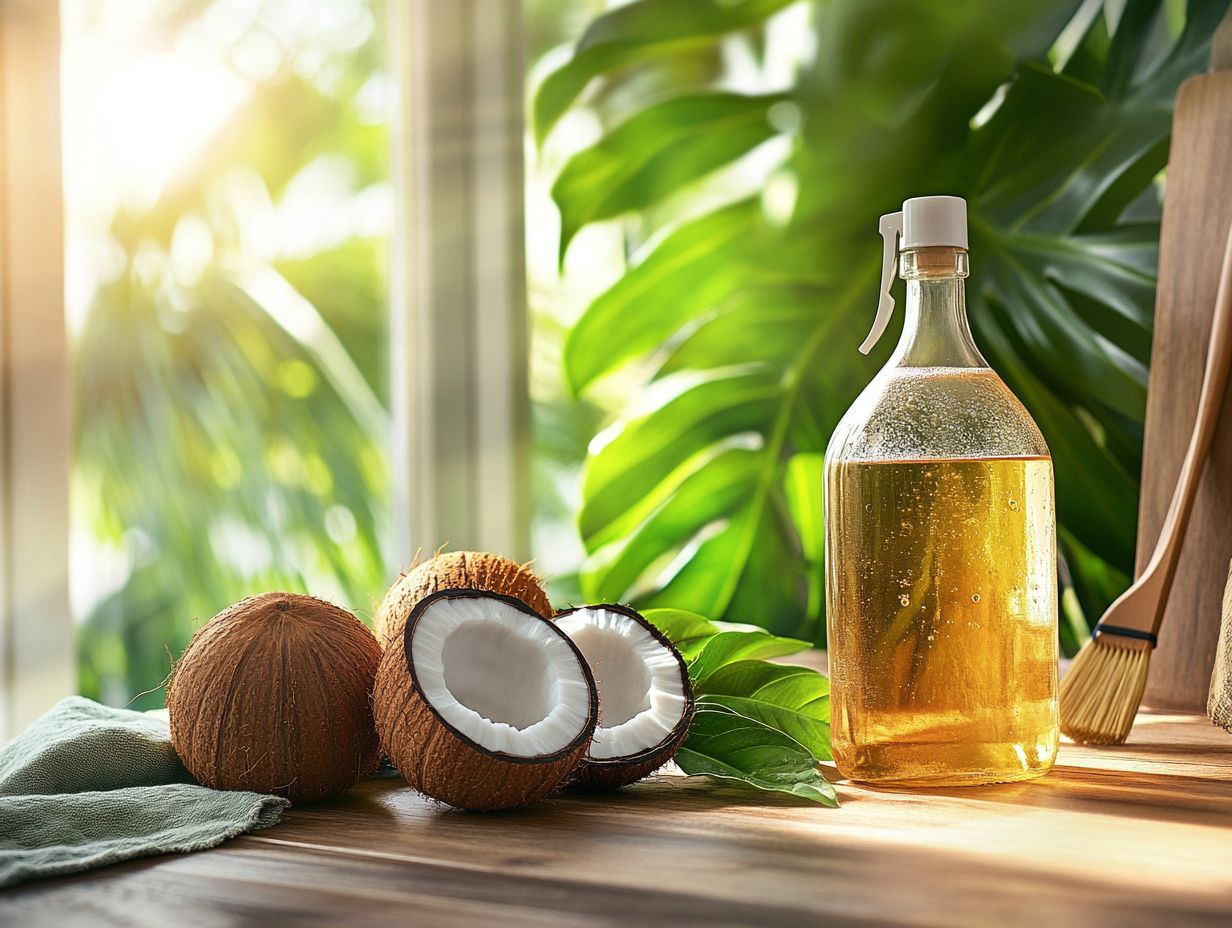
Coconut vinegar excels as a laundry stain remover, leveraging the natural acid found in vinegar to break down tough stains and brighten fabrics. Simply add half a cup of coconut vinegar to your laundry to help maintain clothing quality and hygiene.
Integrating this natural solution into your washing routine can be especially beneficial for various stains and fabric types. For example, when faced with tough grease stains on cotton or denim, applying a mixture of coconut vinegar and baking soda directly to the affected area before washing can yield remarkable results. The vinegar benefits from its acetic acid content, which helps break down stains, and the historical use in tropical regions like the Philippines and South India, where coconut vinegar was traditionally made from coconut water or toddy.
Likewise, if you re dealing with lingering odors and sweat stains on lighter fabrics like whites and pastels, soaking them in a blend of coconut vinegar and water can restore their freshness. When it comes to food stains on delicate materials such as silk or wool, using a diluted solution ensures that your fabric remains unharmed while effectively targeting the stain.
Are There Any Risks or Side Effects of Using Coconut Vinegar for Cleaning?
Coconut vinegar is famous for its amazing benefits. However, it s important to know the possible risks when using it as a cleaner.
Be careful; coconut vinegar can damage certain surfaces, particularly those crafted from natural stones like granite or marble, which can be etched by acidic substances. To avoid any mishaps, it s wise to conduct a patch test on an inconspicuous area of the surface before applying it more broadly, ensuring compatibility.
When using coconut vinegar for cleaning, it’s also advisable to dilute it with water. This not only helps to temper its acidity but also reduces the likelihood of causing damage to your materials. Additionally, maintaining proper ventilation during the cleaning process is essential to prevent lingering odors and to ensure that any fumes dissipate effectively.
Other Uses of Coconut Vinegar
Beyond its function as a mere cleaning agent, coconut vinegar emerges as a versatile ingredient for cooking, baking, health enhancement, and even beauty routines. Many people appreciate its milder taste compared to other types of vinegar, such as apple cider vinegar.
Its multifaceted nature invites you to explore its culinary potential, health benefits, and beauty uses. This exploration can transform ordinary tasks into extraordinary experiences.
1. Cooking and Baking
Coconut vinegar is a culinary gem in cooking and baking. It shines in South Indian cuisine, particularly in Kerala, adding a unique flavor to dishes like mango curry.
Chefs such as Joe Thottungal from Coconut Lagoon and Leah Cohen popularize its use in their recipes.
Its tangy and subtly sweet profile enhances the overall taste and harmonizes beautifully with the spices commonly found in various recipes. Use it to drizzle over salads, in marinades for meats, or blended into dipping sauces that perfectly complement grilled seafood.
Try cooking with coconut vinegar. It can elevate dishes like mango curry, a staple in South Indian cuisine.
When paired with ingredients like garlic, ginger, and chili, coconut vinegar can elevate a simple stir-fry or a traditional pickle, establishing itself as a staple in countless kitchens.
Don t hesitate to experiment with different cooking techniques. Pickling vegetables or using it as a souring agent in soups can bring forth unique flavors while ensuring your dishes remain light and refreshing.
2. Beauty and Skincare
Coconut vinegar is becoming a coveted staple in beauty and skincare routines, and it s easy to see why. With its potential benefits, including good bacteria that support your health and Vitamin C, it can truly elevate your skin health.
You ll love discovering how versatile coconut vinegar is as a natural ingredient that nourishes and helps balance your skin’s pH levels. To incorporate coconut vinegar into your regimen, craft a simple DIY toner by mixing equal parts of coconut vinegar and water. Apply it gently with a cotton pad after cleansing, and feel the refreshing effects.
Transform it into a revitalizing face mask by blending coconut vinegar with honey and oatmeal. This soothing treatment gently exfoliates your skin, leading to a more radiant complexion while minimizing the appearance of blemishes and conditions.
3. Health Benefits
The health benefits of coconut vinegar are impressive. Research suggests it may help regulate blood sugar levels, lower cholesterol levels, and enhance overall health thanks to its potassium content.
It is also believed to support the immune system and combat heart disease and diabetes.
The acetic acid in coconut vinegar has been associated with reduced appetite and improved weight loss. This makes it a tempting choice for anyone looking to manage their weight effectively.
Experts emphasize the importance of the antioxidants found in this vinegar in combating oxidative stress in the body.
If you’re interested in incorporating coconut vinegar into your daily routine, it fits seamlessly into various dishes. Add it to salad dressings, use it in marinades, or mix it into your smoothies.
For a refreshing start to your day, consider diluting a teaspoon in a glass of water it s an excellent way to support digestion and overall wellness. Plus, its probiotics contribute to raw health standards adopted by many within the Western health food community.
Frequently Asked Questions
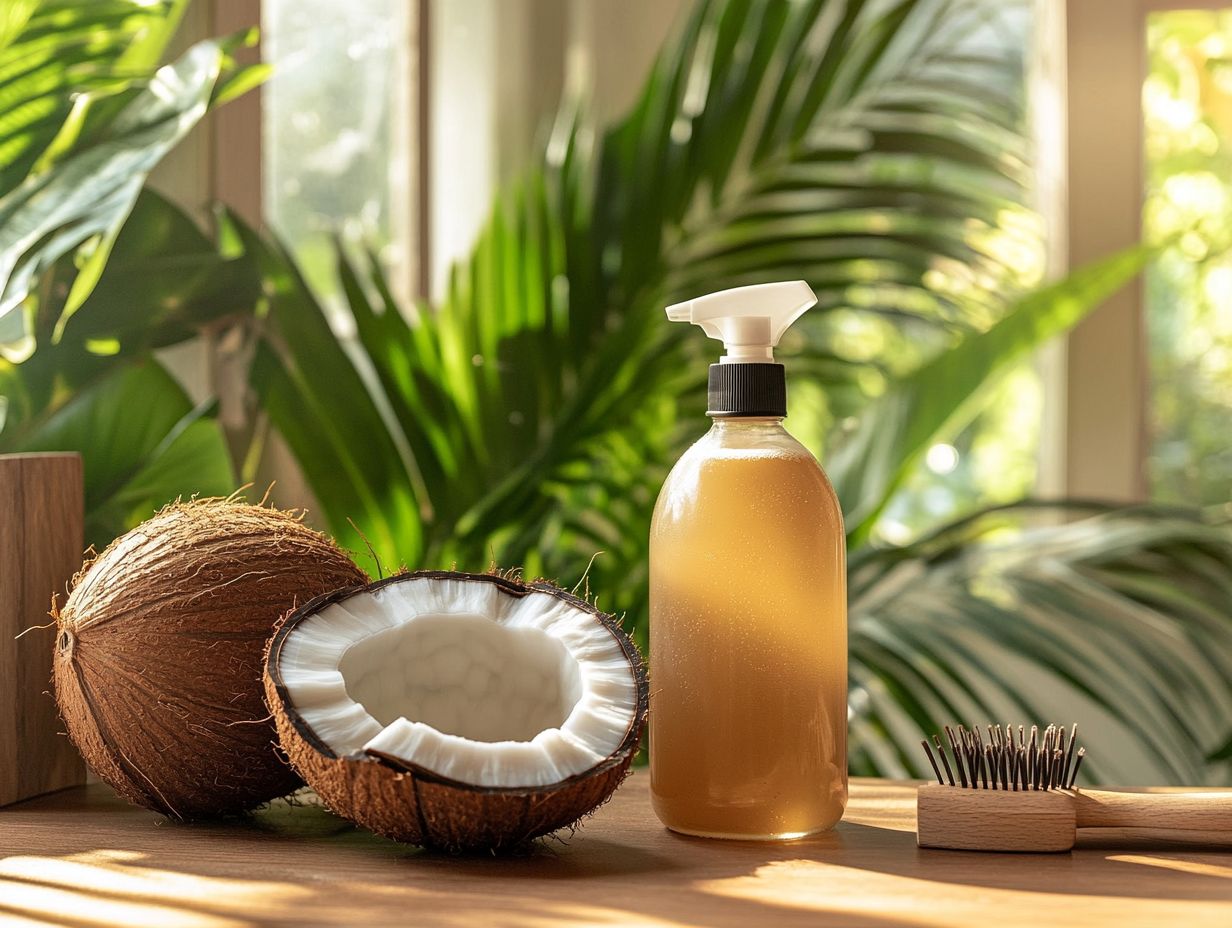
What is coconut vinegar and why is it a great cleaning agent?
Coconut vinegar is a type of natural vinegar made from the fermentation process of coconut water. It is a great cleaning agent because it contains natural enzymes and acetic acid that effectively break down dirt and grime.
How does coconut vinegar compare to other cleaning agents?
Discover the clean and fresh power of coconut vinegar! This natural cleaning agent is not only safe for your family but also effective against tough grime.
Coconut vinegar is a natural and eco-friendly alternative to harsh chemical cleaning agents. It is non-toxic, biodegradable, and safe for use around children and pets. It also leaves behind a pleasant, subtle scent.
What surfaces can coconut vinegar be used on?
Coconut vinegar can be used on a variety of surfaces, including countertops, floors, appliances, and even glass. It is safe to use on most materials.
Always test on a small area first to ensure your surfaces shine without damage!
Can coconut vinegar be used for tough stains and grime?
Absolutely! Coconut vinegar’s natural acidity makes it an effective cleaner for tough stains and grime.
It can easily cut through grease and soap scum, making it perfect for cleaning kitchens and bathrooms.
Is coconut vinegar safe for use on delicate surfaces?
Yes, coconut vinegar is gentle enough to use on delicate surfaces such as wood, marble, and granite.
Its natural formula won’t damage or strip away the finish of these surfaces.
Are there any other benefits to using coconut vinegar as a cleaning agent?
Coconut vinegar is not only natural and eco-friendly; it also has antibacterial and antifungal properties.
This makes it a great choice for cleaning and disinfecting surfaces in your home.

